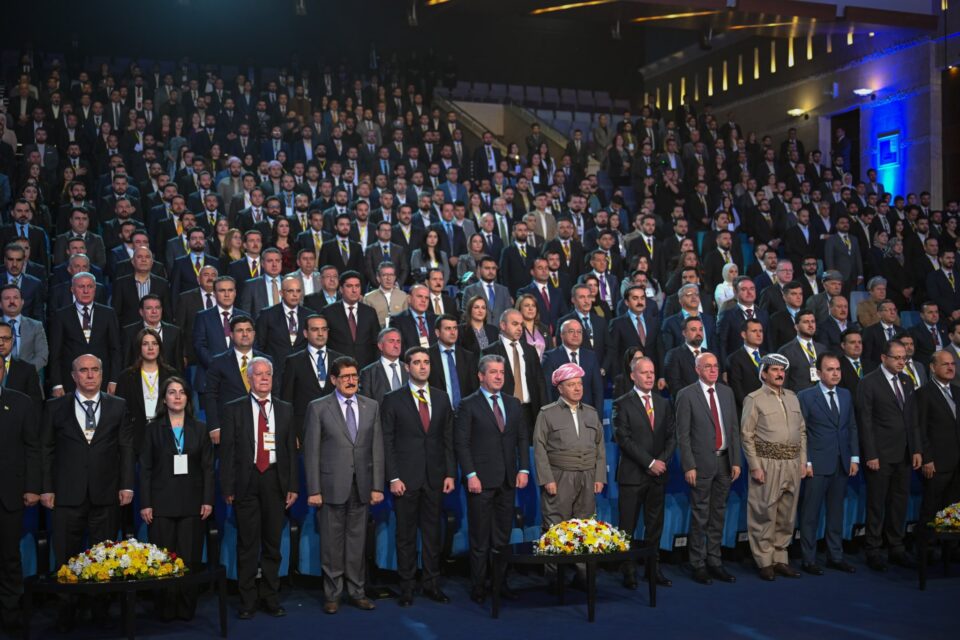Sema
“Baghdad must respect the legitimacy of the Kurdistan Region,” President Masoud Barzani emphasized.
President Masoud Barzani on Wednesday delivered a powerful and comprehensive speech at the historic unification congress of the Kurdistan Student Union and Kurdistan Youth Union, praising the role of youth in past struggles and calling for their continued dedication in confronting modern threats. His remarks covered the pressing issues of relations with Baghdad, international standing of the Kurdistan Region, Turkey’s peace process, and the future of Syrian Kurds.
Relations Between Erbil and Baghdad: “Three Foundational Principles Must Prevail”
President Barzani emphasized that following the fall of Saddam Hussein’s regime in 2003, the people of Kurdistan played a pivotal role in shaping a new Iraq. He recalled that the Kurdistan Parliament made a clear decision to participate in rebuilding the country based on three foundational principles: partnership, consensus, and balance.
“On these principles,” Barzani said, “we returned to Baghdad to build a new federal Iraq.” However, he expressed disappointment that the process has been marred by ongoing centralization and a lack of adherence to the constitution. “If the Iraqi state does not uphold partnership and constitutional commitments, it is impossible to sustain unity,” he warned.
Barzani underlined that the Kurdish people endured decades of dictatorship and will never return to such a system, noting that failure to abide by these foundational agreements risks the very fabric of Iraq’s federal structure.
President Barzani’s remarks served as a stark warning to both Baghdad and internal actors, drawing a clear line between financial dependency and national dignity. He emphasized that “the salary issue must be resolved once and for all,” rejecting the ongoing uncertainty where “we can’t keep asking every month whether someone signed off on the salaries or not.” Barzani criticized this process as degrading, asking pointedly, “Are we expected to beg at their doors?”
He also challenged those within the Kurdistan Region whose only concern is monthly wages, saying, “Let them go to Baghdad and accept whatever decision is made there.” In contrast, he praised those committed to national pride and sacrifice: “Those who care about protecting the sovereign history of Kurdistan and its martyrs — will make their own decisions.”
President Barzani directly addressed Baghdad: “Baghdad must respect the legitimacy of the Kurdistan Region. If federalism is over and you’re treating us under a centralist system, say it openly — so those who accept it can, and those who don’t can make their choice.”
“I reaffirm: Returning to the constitution — the one that defines Kurdistan as a federal region — is the only way to solve all the problems.”
Kurdistan’s Internal Affairs and Youth Responsibility
Turning inward, Barzani praised the historical role of Kurdistan’s youth in every major national movement—from the September Revolution to the fight against ISIS. He stressed that today’s challenges are no longer conventional warfare but battles against ideological collapse, substance abuse, and the erosion of national identity.
“The war today is far more dangerous,” he warned, “it’s a war of narcotics, hopelessness, and disbelief in ourselves.”
Barzani called on youth leaders and organizations to educate their members and communities against drugs and nihilism. “Those who fall victim to drugs are one issue—but those who traffic them are criminals and must be punished,” he said.
He urged young people to cultivate a deep sense of national pride and belonging, asserting that a nation without a land is worthless, and a land without a nation is equally valueless. “Kurdistan became sacred because of the sacrifices made for it,” he said.
Barzani also welcomed the growing participation of women in the student and youth organizations and encouraged the continuation of this trend, calling it “a source of pride.”
The Peace Process in Turkey: “Now that peace is possible”
Regarding the peace process in Turkey, Barzani acknowledged past efforts toward peace and expressed hope for a peaceful resolution that acknowledges Kurdish rights. While he did not delve into recent political developments, he reaffirmed his long-held stance in favor of nonviolence and democratic processes.
“Our position has always been one of peace and dialogue. The path forward for the Kurds in Turkey lies not in conflict, but in political participation, civil struggle, and national unity,” Barzani said, without directly referencing any specific party or entity.
President Barzani noted: “This process is different from the past — this time, all political parties in Turkey, both in power and in opposition, are backing it. They are united in seeking a solution.”
“Whenever there is a peaceful solution and someone still chooses war, it is a betrayal,” he emphasized. “Now that peace is possible, we fully support the process with all our capacity and hope it will succeed.”
The Plight of Kurds in Syria: “Unity is the Only Path Forward”
Addressing the situation of Kurds in Syria, Barzani reaffirmed that they deserve to live freely and with dignity on their land.
“Their rights must be recognized, and they should be treated as citizens with full equality and dignity,” he stated.
He expressed hope for a political solution in Syria that guarantees the rights of all its peoples, particularly the Kurdish population, who have long suffered from marginalization and denial.
He also warned against policies that marginalize or isolate the Kurds, calling on international actors to recognize Kurdish contributions to the fight against terrorism and support a long-term political settlement in Syria that includes Kurdish autonomy.
Closing Remarks “Never think of yourselves as less than anyone else”
In closing, Barzani reminded the young audience of their critical role in safeguarding Kurdistan’s future. “Today’s threats are no less dangerous than those of the past. They may be invisible, but they are destructive—drugs, despair, and cultural disintegration.”
President Barzani urged the Kurdish youth to carry the torch of national values with integrity and to serve their people and homeland with renewed determination.
He concluded with a rallying call: “Never think of yourselves as less than anyone else. Stand tall. Be the product of your nation. Be the generation that wins this modern battle—not just for land, but for identity, dignity, and the future of Kurdistan.”

